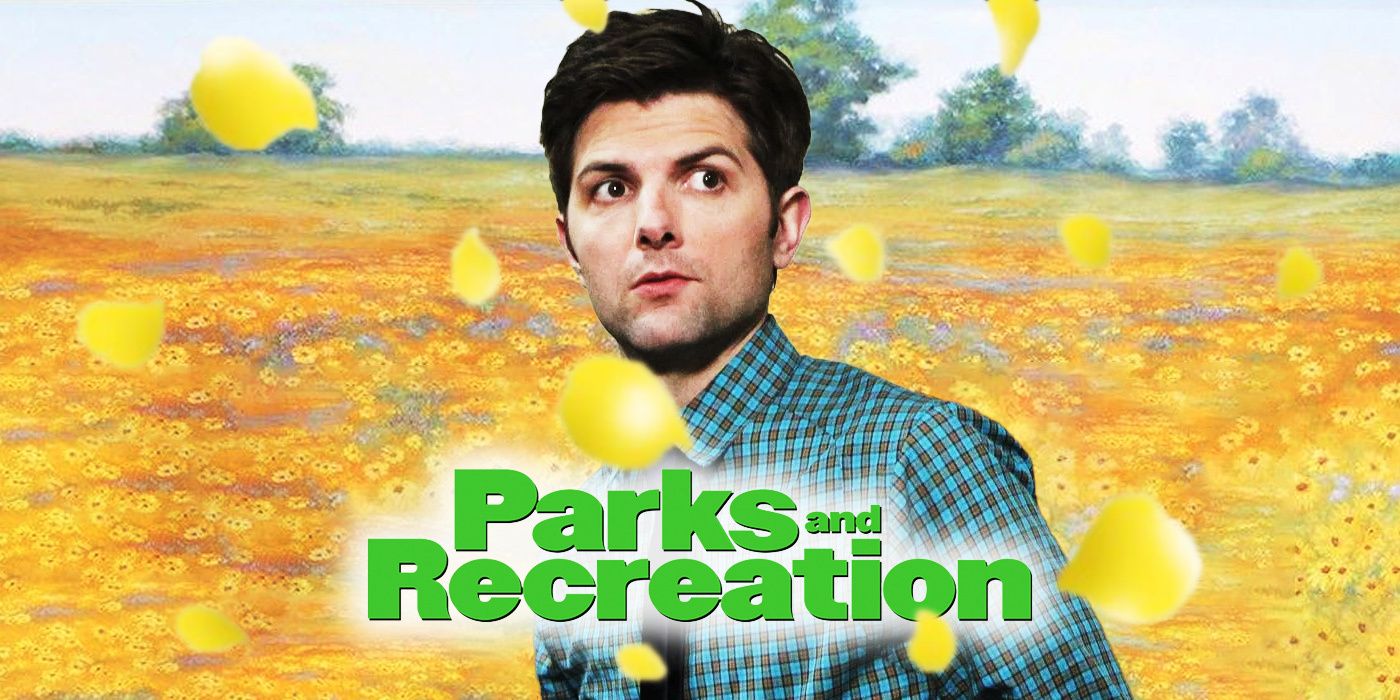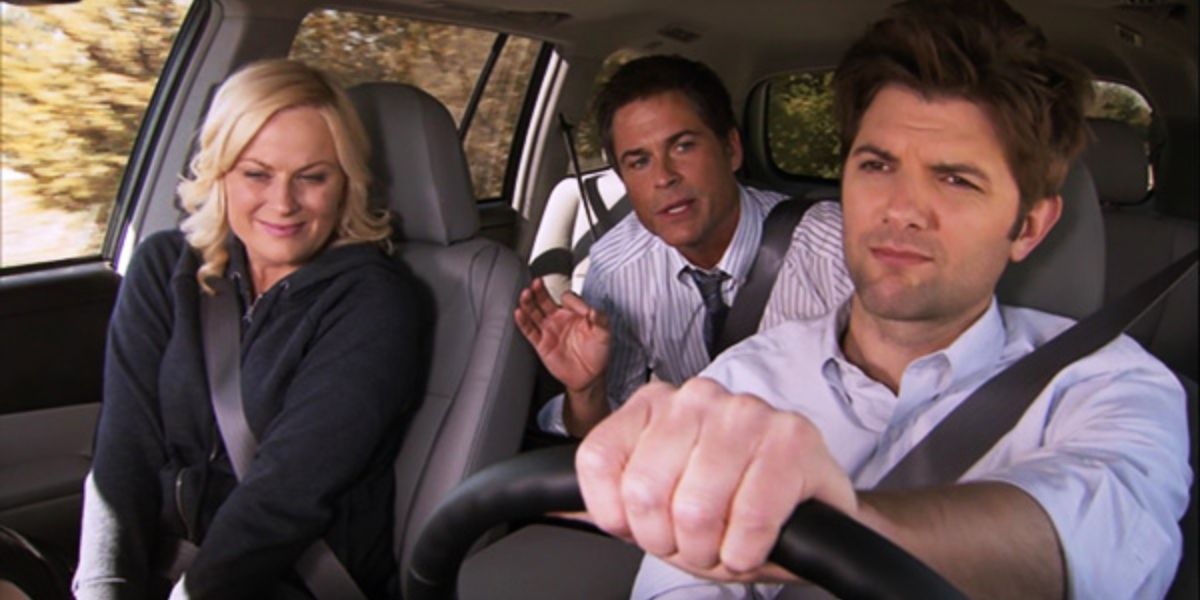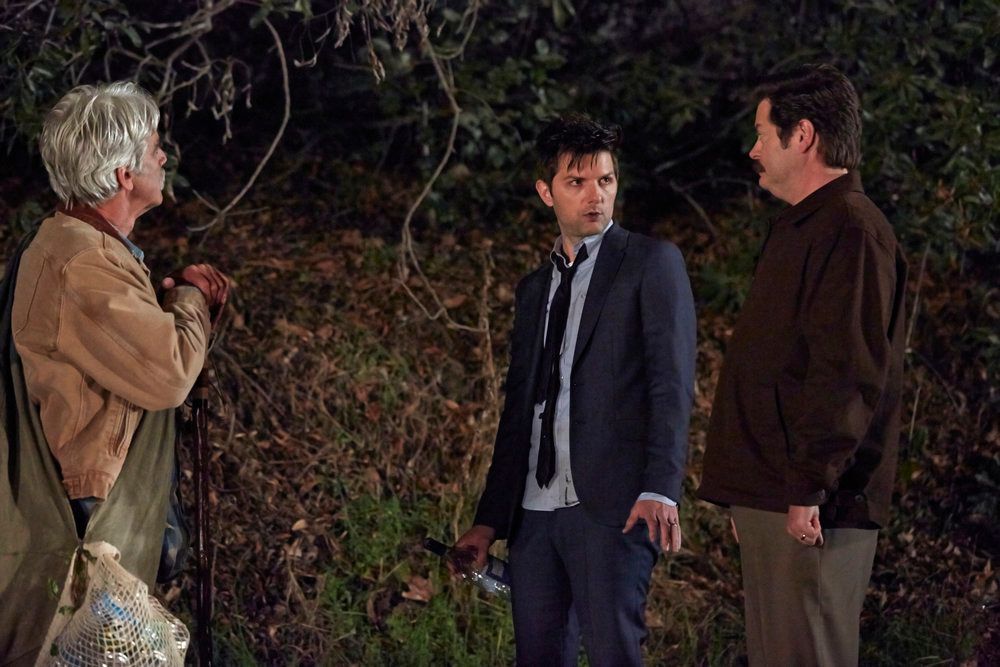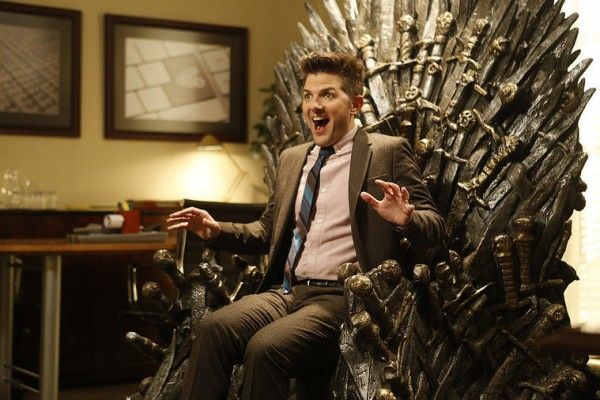Adam Scott is at the center of two very different — and buzzed-about — projects: Apple TV+'s Severance, which wraps up its first season in April, and Starz's revival of Party Down, currently in production. These two series showcase Scott's range, spanning from the former's tense drama to the latter's quirky comedy. In Parks and Recreation, the NBC mockumentary series about the foibles and frustrations of small-town government in Pawnee, Indiana, Scott's performance as state auditor Ben Wyatt moves nimbly across both ends of his creative spectrum. These two sides — the dramatic actor and the comedic one — work together and play off one another, creating the show's most human moments and some of its funniest bits.
Parks and Recreation assembled a top-tier collection of memorable characters inside and outside City Hall. Whether it was Ron Swanson’s (Nick Offerman) love of breakfast and brunettes or April Ludgate’s (Aubrey Plaza) surly barbs, each sharply drawn characterization offers a new favorite for every rewatch. At the show's center is Leslie Knope (Amy Poehler), deputy director and bureaucracy enthusiast — but it took a rocky first season to work out quite who she was and how her coworkers would feel about her. Before the second season, those relationships were retooled so that Leslie’s competence and her coworkers' sometimes-begrudging respect were both foregrounded. Her friendship with local nurse Ann Perkins (Rashida Jones) deepened. Parks and Recreation found its comedic and emotional core when it found Leslie. But it found its secret weapon later, when Scott joined the show as Ben Wyatt and became its ostensible straight man.
At the end of the second season, state auditors Ben and Chris Traeger (Rob Lowe) rolled into Pawnee to fix its budget crisis and ended up completing the show’s puzzle. The impossibly upbeat Chris fit in perfectly, but it was Ben — smart, guarded, a bit ruthless, but persuaded by Pawnee’s charms — who provided the finishing touch. He was a straight man with his own quirks, a serious and responsible force who could still be swept up in City Hall’s silliness.
As Ben, Scott gives a masterful, switchblade-sharp performance that both grounds the show and sends it to new comic heights. Upon arrival in Pawnee, he seems to be a double of Mark Brendanawicz (Paul Schneider), the caustic, cynical city planner and the show’s straight man for the first two seasons. But where Mark did just enough work to get by, Ben was Leslie’s photo negative — just as committed to his job as she was, and aiming just as hard to save the city. Where Mark was often disdainful of his colleague’s antics, Ben was willing to be drawn in.
Scott arrived at Parks and Recreation a seasoned actor with two decades of TV experience, spanning multi-camera sitcoms (Boy Meets World), single-camera comedies (Party Down, whose initial run ended just before his time on Parks and Recreation began), and drama (Tell Me You Love Me). Scott’s performance as Ben called upon all these skills. His precision with a punchline and grounded responses to the absurdity surrounding him were crucial. And his skills as a dramatic actor sold his early confession about his failed teenage mayorship, imbuing Ben with complexity and pathos from his very first appearance.
Scott’s rooted performance, delivered with precisely revealed undercurrents of warmth, provided the final ingredient for the show to truly excel. As an expert straight man, he acted as a trampoline for his more broadly comedic costars to bounce off. His sober concern lets Leslie’s fevered delirium in “Flu Season” spiral to greater heights. His single-mindedness highlights the inanity in Entertainment 720’s airplane hangar of basketball and manicures. And his inability to understand the obsession with miniature horse Lil' Sebastian provides the contrast necessary for the town’s giddiness to sing. He is an expert everyman, the straight man who stands in for the audience while also underscoring the comedy.
This ability to ground the show also made Scott’s performance one of the more romantic entries into the will-they-won’t-they sitcom canon. His steady responsibility in “Flu Season” gives way to a swoon-worthy declaration of appreciation: “That was amazing. That was a flu-ridden Michael Jordan at the '97 NBA Finals… That was Leslie Knope.” Ben and Leslie's spontaneous kiss over receipts in “Road Trip” collapses his carefully calibrated push-and-pull between attraction and obligation, and is even more romantic after watching him take Leslie’s banjo-and-whale-song playlist in stride. Their reunion in “Smallest Park” is so affecting because Scott delivered Ben’s devastation over their breakup with such clarity and deep feeling. His skills as a straight man provided the central romance with its deeply human beating heart.
But Scott’s honest performance also provided the opportunity for his own moments of comedic genius. In every episode, he draws laughs with the same precision he employs as a straight man. A perfectly timed wink over pizza in the accounting office he constantly quits, a confidently delivered pun, or a refusal to let Ann believe Game of Thrones' Lannisters have magic, are small but exquisitely delivered comedic moments, and these laughs pop even more as twists on his usual role as the level-headed observer.
This tension between the straight man and the comedian is even more pronounced in episodes like “The Comeback Kid.” Scott’s performance is virtuosic, meticulously detailing Ben’s depression, desperate need to stay busy, and obliviousness to both truths. That finely detailed portrayal of Ben’s real human struggles only serves to make his responses — “claymaysh” and his “Lo-Cal Calzone Zone” — all the funnier. When his delusions crumble upon discovering the Claymation he compared to Avatar is only two seconds long, it is one of the show’s greatest comedic performances, grounded always in the real human being Scott has built along the way.
Sometimes, though, the straight man implodes completely under its own weight. Because Scott has so carefully crafted a Ben Wyatt who is mature and capable, the moments where he cannot keep control are deliriously funny. Ben’s psychological collapse during TV interviews in “Media Blitz” (above the chyron “Ben Wyatt – Human Disaster”); his blueberry-wine-drunk fence climbing in “Flu Season 2”; his rolling across the floor to dial a phone with his nose while incapacitated with food poisoning in “Ann’s Decision” — all are moments of hysterical physical comedy that explode the rigorously controlled physicality Ben normally moves in. One of the greatest examples of the in-control straight man's hilarious disintegration is in “New Beginnings,” when Ben attempts to prank his coworkers. Scott’s performance as a man clinging hopelessly to the composed image he built across four years while buckling and sweating under the pressure is a comic miracle; in Scott’s delivery, “Here we go to the parking lot now” is howlingly funny.
For seven seasons, Parks and Recreation delivered reliable laughs and consistently compelling performances. It is endlessly quotable and a prime example of romantic tension resolving to great emotional — and comedic — effect. At the center of these successes is Adam Scott, calling on the full spectrum of his abilities to become the dutiful straight man, the emotional center, and at just the right moments, the funniest person on camera.




